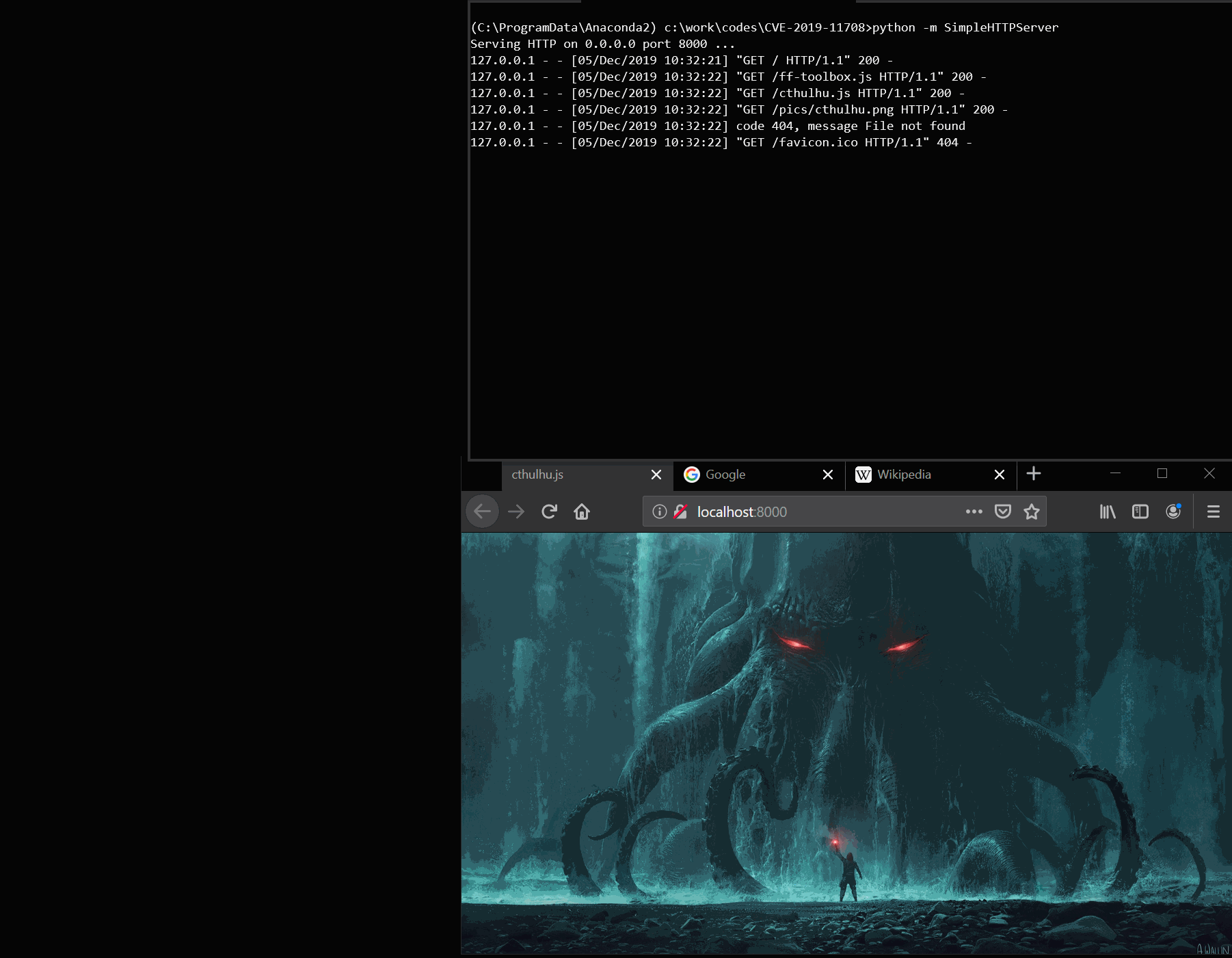This is a full browser compromise exploit chain (CVE-2019-11708 & CVE-2019-9810) targeting Firefox on Windows 64-bit. It uses CVE-2019-9810 for getting code execution in both the content process as well as the parent process and CVE-2019-11708 to trick the parent process into browsing to an arbitrary URL.
I have covered CVE-2019-9810's root-cause and exploitation in the past in A journey into IonMonkey: root-causing CVE-2019-9810 article and in the associated github repository.
CVE-2019-11708 has been fixed by the bulletin mfsa2019-19 and was assigned Bug 1559858 in the Mozilla bug tracker. Here is the summary of the issue:
Insufficient vetting of parameters passed with the Prompt:Open IPC message between child
and parent processes can result in the non-sandboxed parent process opening web content
chosen by a compromised child process. When combined with additional vulnerabilities this
could result in executing arbitrary code on the user's computer.
You can find the commit addressing the issue here: Clean up prompt open calls in Prompter.jsm.
A full-write up of the issue as well as the techniques used in the exploit will be described in an upcoming article on doar-e.github.io.
The exploit has been tested against Windows 19H2 64-bit and it targets a custom build of Firefox so don't be surprised if a bit of work is required to make it work elsewhere :).
The exploit assumes that the support for BigInt is turned on in Firefox which you can do by toggling javascript.options.bigint in about:config.
The exploitation process uses a data corruption to gain privileged JS execution aka God Mode (which is basically an implementation of a technique used in Pwn2Own2014 by Jüri Aedla) which is very different (and much more convenient) from the way I had exploited CVE-2019-9810. This means that there is no control-flow getting hijacked during the exploit chain.
- The exploit uses CVE-2019-9810 to perform the God Mode data corruption and refreshes the current page.
- Once it can execute privileged JS, it finds the current frame message manager and triggers CVE-2019-11708.
- Now that the parent process visited our arbitrary page, we exploit CVE-2019-9810 again and get privileged JS execution there as well.
- At this point the entire browser (sandbox included) is compromised. The first stage is to download and drop a local payload dubbed slimeshady.exe that you can find in payload/ which draws a bunch of animated Slime shady sprites on the desktop with GDI. The exploit also drops and injects a frame script (privileged JS) in every tab to backdoor the whole navigation (already created tabs as well as newly created ones). The tab backdooring is similar to CVE-2019-9810/payload in effect (arbitrary JS injected in every tabs), but this time it is implemented using a Firefox feature (
Services.mm.loadFrameScript) instead of hacky and dirty hooks.
In reality, there are a bunch of more subtle details that are not described by the above and so if you are interested you are invited to go find the truth and read the sources / future article :).
To build the payload, you just have to run nmake from a VS 2017 x64 prompt.
CVE-2019-11708\payload>nmake
Microsoft (R) Program Maintenance Utility Version 14.16.27034.0
Copyright (C) Microsoft Corporation. All rights reserved.
taskkill /f /im payload.exe
ERROR: The process "payload.exe" not found.
if not exist .\bin mkdir bin
python src\genheaders.py sprites
cl /O1 /nologo /ZI /W3 /D_AMD64_ /DWIN_X64 /sdl /Febin\payload.exe src\payload.cc /link /nologo /debug:full user32.lib
payload.cc
del *.obj *.pdb *.idb
if exist .\bin del bin\*.exp bin\*.ilk bin\*.lib
start .\bin\payload.exe
This creates a payload.exe / payload.pdb file inside the payload\bin directory.
I wrote this exploit against a local Windows build synchronized to the following revision id: 2abb636ad481768b7c88619080cf224b2c266b2d:
$ hg --debug id -i
2abb636ad481768b7c88619080cf224b2c266b2d
And I have used the following mozconfig file:
. "$topsrcdir/browser/config/mozconfigs/win64/common-win64"
ac_add_options --disable-crashreporter
ac_add_options --enable-debug-symbols
. "$topsrcdir/build/mozconfig.clang-cl"
. "$topsrcdir/build/mozconfig.lld-link"
# Use the clang version in .mozbuild
CLANG_LIB_DIR="$(cd ~/.mozbuild/clang/lib/clang/*/lib/windows && pwd)"
export LIB=$LIB:$CLANG_LIB_DIR
ac_add_options --enable-js-shell
ac_add_options --enable-jitspew
mk_add_options MOZ_OBJDIR=@TOPSRCDIR@/obj-ff64

